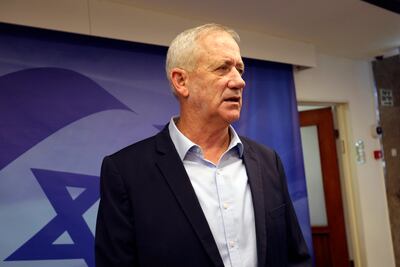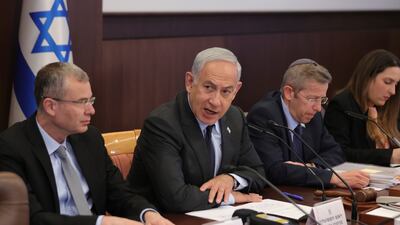Three new public surveys in Israel show that Prime Minister Benjamin Netanyahu's right-wing coalition would lose its majority in parliament if elections took place today.
The polls also showed a surge in support for the opposition National Unity party led by former defence minister Benny Gantz.
According to a poll released by Channel 13, Mr Netanyahu's five-month-old coalition would win as few as 49 seats in a vote, a significant decrease from its tally of 64 now.
In contrast, National Unity would win as many as 30 seats, more than double its current tally of 12.
A survey by Israel's public broadcaster Kan predicted that the ruling coalition would win only 51 seats — 10 short of a majority in the 120-member Knesset, while the right-wing outlet Channel 14’s poll suggested they would win 58 seats
The findings reflect fierce public opposition to the government's plans to make radical changes to Israel's judicial system that would weaken the power of the Supreme Court and give the government more say in how legal officials are appointed.
Protests against the legislation have drawn tens of thousands on to the streets each week, although roughly 200,000 people demonstrated in support of the changes last week.

In a turnaround for the left of Israeli politics, all three polls found that Labour would not pass the electoral threshold, in which a political party must receive at least 3.25 per cent of the vote to get a seat in Parliament.
However, Meretz, a party farther to the left than Labour and which failed to pass the threshold in 2022, would win four or five seats.
Mr Netanyahu returned to power in December at the head of coalition comprising his Likud party along with right-wing and far-right allies, following a turbulent period in Israel politics when there were five elections in three years.
Israel's next elections are scheduled for 2026, although the government will fall by the end of the month if it fails to pass the state budget, a process that will be made harder by a number of stringent budgetary demands from coalition parties and Israel's reduced tax revenue in recent months.
Israel's Parliament began its summer session on Sunday, concluding a month-long recess in which negotiations were held between government and the opposition to find ways to compromise on the divisive judicial legislation.


